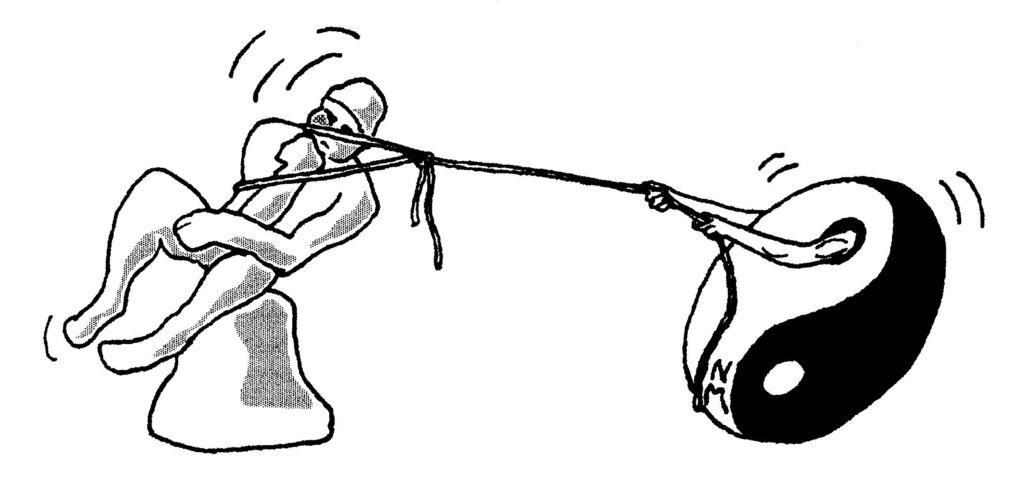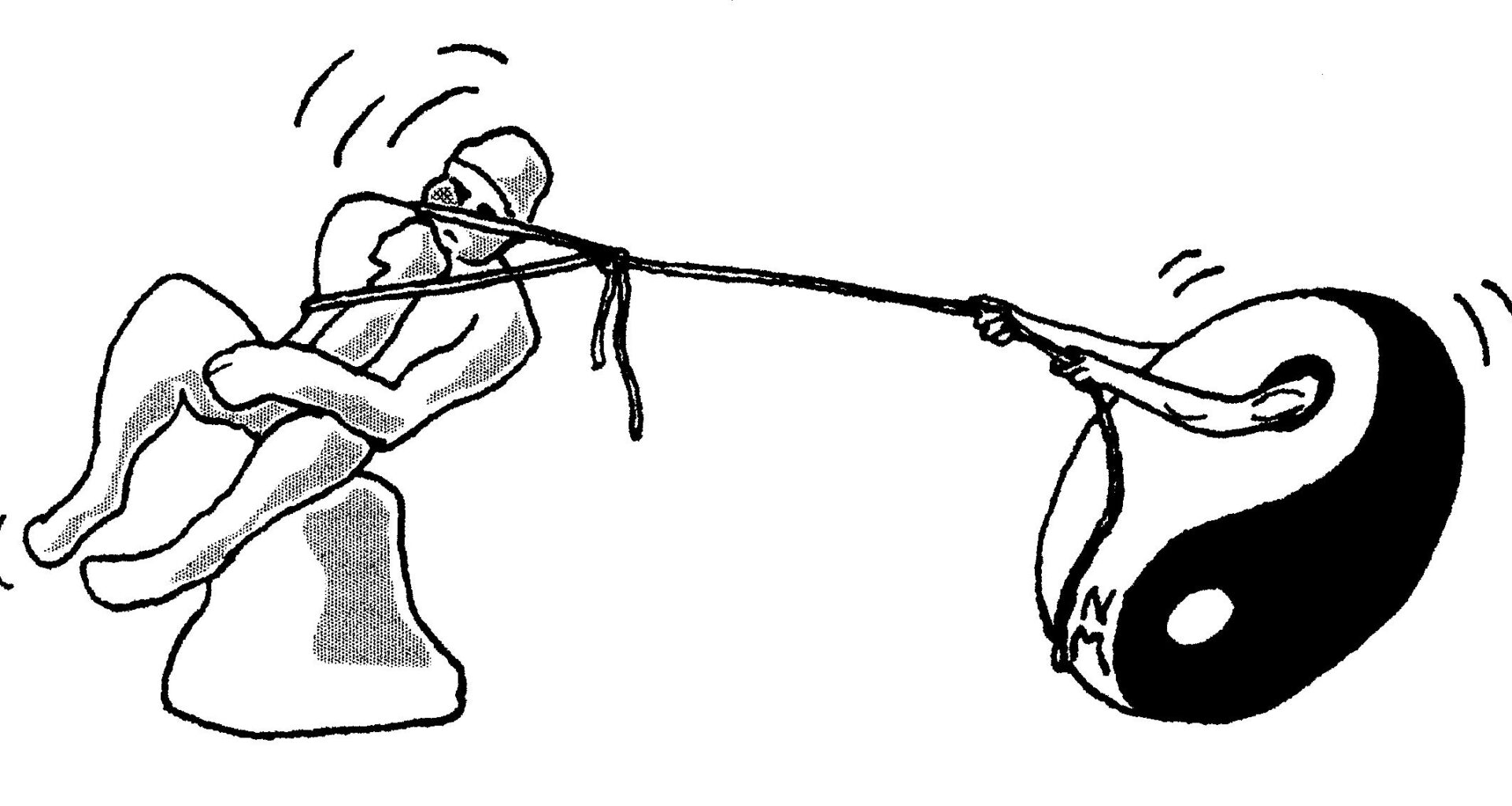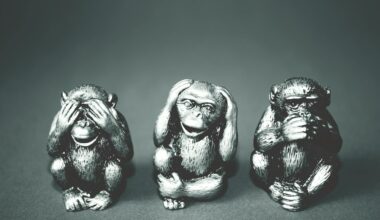
Much of the philosophical and religious thought that may very loosely be categorised as ‘Eastern’ endeavours to show people how to ‘liberate themselves’ both from the ego and from step-by-logical-step thinking. This is a deliberate abdication of precisely our most valuable attributes. Of course, it does not do this because it is stupid—it isn’t. It chooses this path because those attributes are admittedly imperfect. Unfortunately, this is like giving up entirely on going to the doctor because medicine, too, is imperfect.
But this is not a solely philosophical matter. It is also illuminating to look at it from a political perspective. Oriental philosophy by and large enjoins accepting things as they are, going along with the flow—as exemplified by the key Taoist concept of wu-wei, ‘not striving’ (among other translations), since any striving is regarded as counter-productive and surely destined to fail. It hardly seems coincidental that this is a philosophy arising among, and especially suited to, people who politically and socially lacked much agency for change and, hopefully, improvement.
To state it more bluntly: in this regard, it is a philosophy tailored for vassals who are to be kept in their place, and for political systems that see evolutionary change as inherently bad. A dynasty may be toppled and followed by another dynasty, but the idea itself of being ruled forever by dynasties (kingly or even of a modern, more corporate type) is not to be questioned. Give me stasis, or I’ll give you death.
The above qualifications ‘very loosely’ and ‘by and large’ reflect the obvious fact that Oriental religio-philosophical thinking is not monolithic but varied. Yet, even granting this diversity, it would be inattentive not to notice overall patterns. At the same time, parts of this thinking are not exclusive to the East, either. For one example, just turn to the US’s late grand old man of geopolitics, Henry Kissinger, the heart of whose political philosophy, as he made clear in his book World Order, was that something is good if it keeps a lid on things. (He regretted the French Revolution, for example, not on any grounds related to whether people were better or worse off because of it—that was largely immaterial to him—but because it swept away a self-correcting European order that had held since 1648.)
But again, the general pattern is that the preference for immutability is more of an Eastern than a Western thing; the West tends to see stasis as stagnation. The major exception to this dichotomy is in religion—specifically, religion defined not in association with a general system of philosophical thought, but with an organised, hierarchical structure. Religion in this form is always a tool for social control and a belligerent guardian of the status quo in West and East alike. (For social control, much of the East hasn’t even needed it where a non-religion, Confucianism, has been there to perform that role.)
According the ego its proper place is one of the triumphs of Western thought. Having a self-aware ego is our most basic treasure.
The West stands for a never-ending struggle for change for the better, despite stumbles and setbacks. A lot of bad things can be said about the West (although such rather widespread impressions as that imperialism or slavery are uniquely Western traits are grotesquely misinformed). But the notion that it is better to seek progress than to preserve existing conditions at all costs is one that should genuinely be cherished. This idea has allowed the West to achieve progress in many areas—and to keep working on its own, and others’, problems.
It is logical that populations which see no chance of ever escaping a preordained hard lot or severely subservient position will seek evasion in mystical doctrines that take them away from themselves and their reality. Conversely, their adherence to such thinking helps keep the systems that preordained their miserable position in business. It’s a loop.
The West is also the birthplace of the self as associated with an individual who is more than a cog in the whole. That clearly doesn’t mean that otherwise people don’t know who they are; it means that they don’t define themselves only in relation to a community which they form part of and must, above all other considerations, serve. Of course, a balance needs to be struck between the individual and the group, between the ego and the collective. (It should be clear that ‘ego’ is herein used simply in the sense of self-awareness, not in the Freudian sense or that of an excessive self-regard.) But the moral and practical imperative to be solidary with others need not and should not mean giving up the self. According the ego its proper place is one of the triumphs of Western thought. Having a self-aware ego is our most basic treasure.
Wild, to-hell-with-the-others individualism is bad—and so is the opposite extreme position, that hell is me. (And that thus, I need to abandon or ‘transcend’ my ego. By the way, what a contrast, quite coincidental of course because the context is different, from Sartre’s ‘Hell is other people.’) Every person born comes with an ego. The alternative to coming to life, with the attendant ego, would be to remain in nothingness forever; the birth and the ego are a win in a cosmic lottery that offers staggeringly low chances. To throw the ego away is therefore an appalling waste.
Why does Eastern philosophy want to jettison it? Because it says the self—what Hinduism calls atman, although equivalences in these matters are seldom complete—stands in the way of realising the true nature of reality. Two points about this. First, it takes it for granted that the ego could not, by being made aware of the danger, in some way hold itself in check and see things straight after all.
Second and more seriously still, what is that true nature of reality which the ego allegedly clouds? In that worldview, it is that we, along with everything else, are just part of, or emanations from, a mystical supreme entity or unchanging ultimate essence, whose existence it posits (Brahman, in Hinduism; Buddhism doesn’t give it a name but believes in it). There are many nuances to all this but in any case, making a prior assumption of what is the ultimate reality isn’t at all what we understand by searching for reality. So, sacrificing the ego to facilitate this ‘search’ is pointless.
Another reason that Eastern philosophy, Buddhism in particular, asserts that the self is an impossibility is that it is in eternal flux: our ego of a moment ago is gone with the moment itself. (This goes for everything else; nothing then really exists except in the actual now.) This is in a way comparable to Zeno’s paradoxes of motion and to the solipsist’s failure to prove the existence of anything outside his or her own mind.
As I have intimated in an earlier article on persistent philosophical errors, in these matters the shortcomings belong to philosophy, not reality. In actuality, even as the philosophers with such proclivities tie themselves into knots, Achilles does catch up with the tortoise1. Things outside solipsists’ heads do exist and would do so whether solipsists themselves existed or not. And our self does manage to hold on to itself despite being presented with the notion that it was a different thing a moment ago. (Let’s face it, worse things have happened to our sense of self. We thought our organism was singular, and it turns out that we are symbionts with bugs, countless bugs, inside us. Yet here our ego still is. The question of whether the minute creatures have their own little egos remains open. But if they do, they should prize them.)
Next comes the decisive matter of rational, careful, step-by-step thought. The Oriental religio-philosophical persuasion—again, loosely defined—actively works to undercut or at least bypass it. Instead, it puts its faith in a direct apprehension of reality.
Why does the Eastern tradition distrust rational thinking?
Rational thought is one of our greatest properties as individuals and as a species. For someone in the Western tradition, it feels silly merely to state something so obvious. The fact that increasing numbers of animals are finally winning the acknowledgement that to varying extents they too can think rationally, and not just instinctively, and that they have degrees of self-awareness that could be likened to an ego, does not in any way diminish the paramount importance of these gifts for us.
It is the West (why not say it more precisely? Greece) that is the birthplace of the espousal of linear, rational thought for pursuing any line of enquiry and even for its own sake—and not mainly to create, justify, and extend religious or quasi-religious systems.
Why does the Eastern tradition distrust rational thinking? Because it feels that the latter’s way of categorising and labelling things destroys their wholeness. It may have a point—as long as this wholeness is understood only as a possible complex and fragile inner connectedness, and not as some mystical attribute. But it goes too far, not least with its underlying assumption that only the wholeness is worth considering, not the inner workings.
Oriental thinking, with Buddhism to the fore in this, also holds that the reality of the world is simply too elusive, too full of complexities for rational thought to stand a chance with it. From this elusiveness and complexity—and this is the crucial point—it reaches the conviction that it’s useless to try; Buddhism calls the attempt to do so trishna, ‘grasping’.
Actually, that something is difficult does not mean that it is necessarily impossible or that it isn’t even worth attempting. Attempts to show the inherent uselessness of ‘grasping’ via analogies, like that of a fist trying to get hold of itself or a net trying to catch water, beg the question of whether those analogies are the appropriate ones. Rational, ordered thought does lead to greater understanding in many cases—and even in cases in which ultimate success is not reached, much may anyway be learned during the attempt. Meanwhile, the difficulty of the attempts is made greater by the defeatist attitude inherent in ideas of trishna and the like.
As usual, what is needed is to find a balance (even if that itself may be difficult). Eastern thinking could be less of a quitter when it discovers that the world makes no effort to be readily understandable. And the Western line of approach could be more welcoming of lateral thinking and a hunch here and there. Reason is indeed limited in several ways (it needs to be tempered with compassion, we aren’t all that good at it anyway, it should sometimes stay out of the bedroom, and so on). And yet our ability to be rational, or at least as rational as we can manage, remains our best resource. Pace Oriental philosophy, no, it isn’t doomed from the start.
A word (all right, a paragraph) about any claims that Oriental thinking is a source of superior ‘spirituality’ or ‘wisdom’. The very idea that people were or are spiritually better off when under the thumb of superstition or religious establishments or essentially escapist philosophies is nonsense. However one may feel about that, the proof is in the results: the claims in question ring hollow in populations provenly just as subject to brutal spasms of violence as those in the West.
One should abandon neither one’s self, nor rational thought, nor the rational world—instead, if able and willing to do anything about them, one should work on improving them.
Related reading
Two cut-the-nonsense thinkers who overcame the philosopher’s curse(s), by Nicholas E. Meyer
Religion and the decline of freethought in South Asia, by Kunwar Khuldune Shahid
The rise and fall of god(s) in Indian politics: Modi’s setback, Indic philosophy, and the freethought paradox, by Kunwar Khuldune Shahid
- Corrected 14 September 2024. It originally read ‘hare’ rather than ‘tortoise’. ↩︎









Your email address will not be published. Comments are subject to our Community Guidelines. Required fields are marked *
Donate